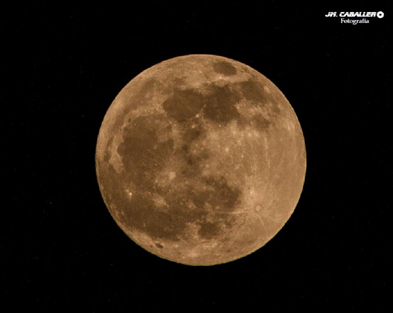Last week we have seen, from Spain, the "perigee of the Moon"; ie, the shortest distance among the Moon and the Earth. So, we have seen the Moon much larger than other times, when there was a full moon. And it has been called "Supermoon". It also happened for a few days, in the first half of July.

To Romans, there was the Moon Goddess (Luna); for Greeks, was Selene, who was the sister of Helios (the Sun God) and Eos (Goddess of Dawn). Helios means: “Who sees everything”. It is said that he drived a carriage, through the sky to the Ocean, every day, surrounding the earth, from the east to put itself in the west, at night. And it was the moment of Luna (Moon), who was represented by a beautiful woman , pale face, driving a silver chariot, drawn by a yoke of white oxen.
In Classical Mythology, there is a nice myth, related to the Moon. This myth says that Endymion (a shepherd of Caria and grandson of Zeus) fell in love with Selene. Then, he asked Anthems (the god of sleep) being able to sleep, with open eyes, to look at the Moon, when she was crossing with her carriage, the night sky. And the god Hymns, who was in love with this shepherd, gave him the desire to sleep with their open eyes, because Hymns wanted to see his eyes, during the night.
Some days ago, we have seen, very well, both from Spain and from other countries, the full moon, because it was in its "Perigee". It comes from the Greek "Peri - geo" ("around the Earth"). The Perigee is the point at which a star in its orbital motion, is closer to the Earth. And we use the word contrary, when the star reaches the farthest point in its orbit; it is said the same thing, when someone goes far, that it has succeeded in its life, we say that person is in full swing (ogee). Here we see the Greek root "apo", that means "lejos" (Apogeo = Apogee); then, "Apogee" means: "when it is far, higest".
These days we have been in “full (llena) moon”, “full (plena) moon”, his double: full (llena) and full (plena, booming); from there comes "Plenilunio" (Plenilunio is not very used; we use to say “Luna llena” (“Full moon”).
When meeting the Moon in its nearest point to Earth, the attraction of the moon is greater than the rest of the year. So, a few weeks ago, we have watched, on TV, some high tides, "spring tides" --also called "perigee tides"--.The Romans knew this fact (about the spring tides) and, for centuries, they used the Lunar Calendar and attributed to the Moon, certain odd behaviors, crimes, etc. People who were suffering madeness, occasionally, when there was a full moon, they were called “Lunaticos” (“Lunatics”).
The day of the Moon is “Lunae dies” and from it comes: “Lunes” and, in English “Monday”, that is like Moon, but only with an “o”; so, it should be “Moon – day”.
The Moon was the measure of time in antiquity. In Latin, we have the word "Mensis", which means moon, first, and then “Mes” ("Month"); and from there it comes “Mensual” ("Monthly"). Mensis refers to the temporal dimension of the Moon. However, the word Moon refers to its physical dimension, its appearance.
The Moon has the same root than Lux, Lucis (in Latin) (Luz = Light); the verb Lucere (Lucir = Shine); the noun Lumbre (Fire). All of them, with the same Indo-European root “Leu”, from where comes “Leucocito” (Leukocyte). Therefore, originally, Moon means “Which is illuminated”, “Which shines”.
Well, that is all about the Moon, by the moment. I hope that you have thought that it is interesting and it used you to learn a little bit Spanish.
Until my next blog post, kind regards,
Luis.
Sponsored by Costaluz Lawyers
Please click below:
